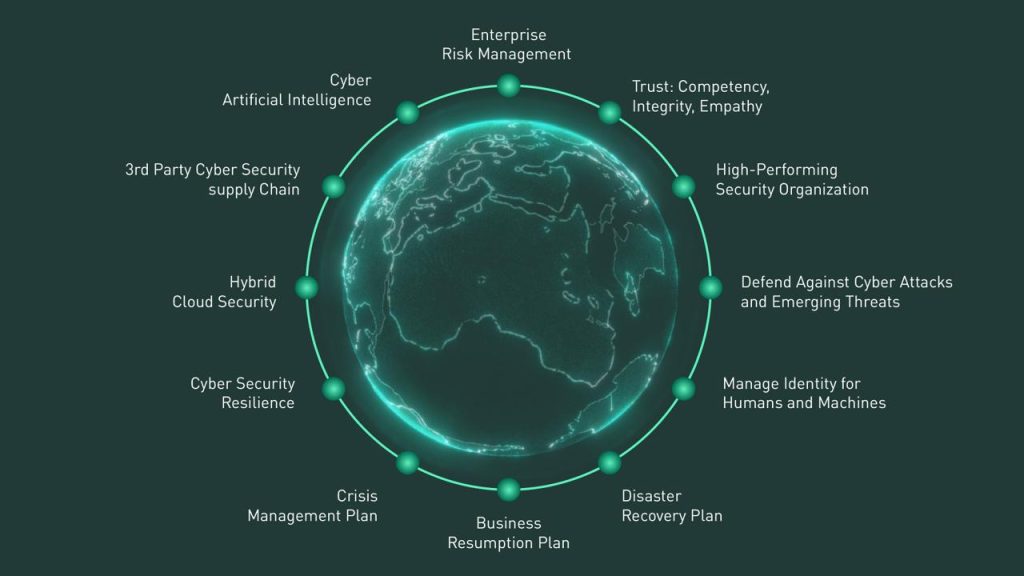MENA ISC 2024 anchors the Kingdom’s strategic cybersecurity goals by encouraging increased collaboration between various players in the sector to achieve a hyper-resilient cyber-infrastructure
Riyadh, Saudi Arabia-: In today’s world, the top 5% of cybersecurity teams are setting a new standard in digital trust through robust defense strategies. According to PwC’s 2024 Global Digital Trust Insights survey, these elite teams demonstrate exceptional capabilities, with 96% of them consistently responding quickly to threats, enabling their organizations to emerge stronger from disruptions. Additionally, 94% of these top performers incorporate data security and privacy features into their products, services, and third-party relationships. Furthermore, 96% of the top 5% have successfully implemented controls throughout their organizations to prevent serious cyber disruptions, significantly outperforming the general respondent group, where only 25% to 30% achieve similar outcomes, indicating integration of cybersecurity in strategic business initiatives as cyber incidents are the most feared cause of business interruption, surpassing natural disasters or energy concerns.
With the Kingdom’s strategic goal of being one of the most digitally-forward and advanced economies, the increasingly sophisticated and pervasive nature of cyber threats are pushing organizations to adopt a newer concept known as “hyper-resilient cybersecurity” to protect their digital assets in this push towards digitalization. This new paradigm in cybersecurity leverages a combination of advanced technologies, along with Artificial Intelligence (AI) and Machine Learning (ML) at the forefront, to create a robust defense against evolving cyber adversaries.
Clinton Firth, Partner, at PwC Middle East said:
“Cyber resilience is no longer just a defense mechanism; it’s a strategic imperative. In today’s interconnected digital landscape, organizations must not only defend against cyber threats but also anticipate, adapt, and recover swiftly. Saudi Arabia’s ambitious Vision 2030 aims to position the Kingdom as a global leader in digital transformation, and its efforts toward building a hyper-resilient digital infrastructure reflect this commitment. By fostering collaboration between public and private sectors and adopting advanced technologies like AI, the Kingdom is not only enhancing its cybersecurity posture but also setting a new standard for others to follow.”
AI and ML have revolutionized the cybersecurity landscape in both positive and negative aspects. AI and ML technologies enable real-time threat detection and adaptive response mechanisms and are expected to drive a 30% reduction in false positive rates for threat detection and application security testing by 2027 while reducing incident response times by up to 12%, allowing for faster mitigation of threats. Another application of AI and ML is Continuous Threat Exposure Management (CTEM) which involves proactive monitoring and prioritization of vulnerabilities, allowing organizations to address potential threats before attackers exploit them.
These technologies analyze vast amounts of data to identify anomalies and predict potential threats before they can inflict damage and security professionals report that AI and ML have significantly improved their ability to prevent cyberattacks and maintain a strong defense posture, and according to PwC’s 2024 Global Digital Trust Insights survey, nearly seven in 10 say their organization will use generative AI (GenAI) for cyber defense. GenAI tools can help reduce a disadvantage for cyber teams overwhelmed by the sheer number and complexity of human-led cyber attacks, both of which continually increase.
Zero Trust Architecture, another critical component, operates on the principle of “never trust, always verify.” This approach requires continuous verification of user identities and access rights, minimizing the risk of unauthorized access through strict access controls and monitoring. As hybrid cloud adoption increases, robust cloud security measures are essential to prevent unauthorized access and data breaches, ensuring data integrity and confidentiality in cloud environments.
The Internet of Things (IoT) has expanded the attack surface, making IoT security a critical focus. IoT security solutions aim to secure device communication and data integrity, preventing unauthorized access and data manipulation. Meanwhile, Identity and Access Management (IAM) solutions ensure that only authorized users can access sensitive resources, incorporating threat detection mechanisms to bolster security postures.
By integrating these technologies, organizations can build a hyper-resilient cybersecurity framework capable of withstanding the evolving threat landscape. This comprehensive approach enhances threat detection and response and also ensures that critical digital infrastructures are better protected against sophisticated cyber adversaries.
Encouraging and fostering deeper collaboration between various agencies and parties such as the private sector, the public sector, international players and the governmental sector becomes a critical task for the cybersecurity industry to be able to achieve a “hyper-resilient cybersecurity” framework. PwC’s survey also shows that leading cybersecurity teams understand the importance of maintaining strong relationships with the public sector with 85% of the top 5% of cybersecurity teams regularly engaging with public sector entities at all administrative levels, far surpassing the general industry practice, where only 21% of teams maintain such relationships to to build organizational resilience.
MENA ISC 2024, with the theme – Hyper-Resilient Cyber: Navigating the Evolving Threat Landscape of the Interconnected World of IT, OT, IoT, IIoT, & Hybrid Cloud, aims to be a trusted platform for cybersecurity professionals, CISOs, IT and OT professionals, as well as policymakers in the region and in Saudi Arabia, which is one of the fastest growing and key markets internationally, to address and share knowledge on cybersecurity’s most critical and emerging issues through first-hand interactions.
This year’s conference will bring together leading local and international players from both the private and public sectors, including CyberKnight, a leader in cybersecurity solutions distribution; Cyber Polygon, renowned for its advanced cybersecurity training and simulation platforms; and Salam, a major Saudi-based telecommunications provider. Prominent international companies such as Kaspersky, Google Cloud Solutions, and Crowdstrike, along with local Saudi cybersecurity leaders like NourNet, will also be in attendance. Together, they will offer valuable perspectives and solutions, fostering crucial collaborations essential for establishing a cybersecurity framework that not only defends against but also swiftly recovers from and learns from cyber-attacks and disruptions.




